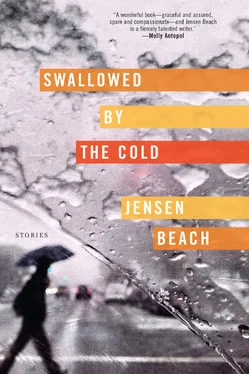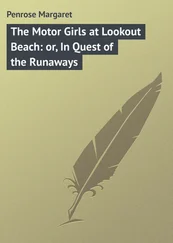Men in shorts and tuxedo jackets roamed the room, serving drinks and offering appetizers. Lennart considered taking one but didn’t. He recognized a television actor and one of the newsreaders from TV4, whose voice he’d always found attractive. A woman in a long white dress stood in a corner, offering a dramatic vocal performance in which she produced no sound. “This is unusual,” Bent said. In the far corner, a group of people in all-white clothes danced beneath a black light.
Lennart led his grandfather into a room that was set up to resemble a theater. Rows of chairs faced a wall of thick curtains. White ribbons had been attached to the heating vents on the walls. In the warm air, the ribbons waved a pantomime of a winter storm. Lennart listened to the murmuring of conversations coming to an end and the clinking of glasses being placed on the floor. A glass or two toppled over. There was some distant laughter. The room was humid with late winter. Lennart helped his grandfather up the center aisle. They took seats near the front. Almost immediately, the room grew darker. The curtains parted to expose a projection screen and on the screen appeared the image of a summer cottage. It was a traditional Swedish summer cottage with white trim and Falu-red planks running vertical to the ground and a small garden surrounded by a short, white fence. The camera stayed fixed on this image.
Lennart saw light reflected on the screen from an opening door at the back of the theater. Then a man in a tuxedo walked in front of the screen and tapped a microphone pinned to his lapel. A faint light was directed at him from above. He introduced himself as the artist and thanked the audience for coming. The audience applauded. “The footage you’re about to see has been manipulated, but much of it was first recorded during the Winter War and can be found in its original form in the national archives.” He pointed at the screen. “The cottage you see behind me is my summer cottage in the archipelago, and the film comprises a single year, compressed into seventy-five minutes.” There was more applause, and then the artist continued. “This is called The Winter War.” He walked from the stage and sat down in the front row. The scene irritated Lennart and he crossed and uncrossed his legs twice.
Nothing appeared to be happening on the screen. Soon Lennart saw movement. Wind rustled the bare branches of two tall birches to the left of the cottage. A bird landed on one of the trees and immediately flew out of frame. It was night. Then it was day. This happened slowly at first and then very fast until he was unable to determine which was day and which was night. A single flower in the garden bloomed. Others soon followed. The grass up against the cottage grew long where it would have been difficult to trim. There were blurs of movement across the frame, the artist, he assumed, coming and going. Everything moved fast. Then, as suddenly as they’d bloomed, the flowers wilted and died. The leaves on the trees turned yellow and red and fell to the ground. It rained and then it cleared. The brightness of the sunlight shone out into the room, illuminating faces in the first two rows. Everything slowed down. A storm moved in above the cottage. It started raining again. The rain turned to snow. Snow covered the grass, the roof, the windowsills. The garden disappeared. There was only the white of the snow and the red of the cottage. Icicles reached for the ground from the rain gutters. The sky was gray.
In the foreground a group of soldiers appeared. They were crouched in a trench. He counted at least a dozen. They moved with unsteady motion about the trench. Beyond them the cottage loomed. The trench stretched the length of the bottom of the frame. The camera angle and contrast of the two scenes flattened the perspective, removed the image’s depth. Lennart blinked against the light. The soldiers were dressed in white capes that blurred the falling snow against the dirt of the trench. Some of the soldiers stood and looked over the edge of the trench at the cottage and the violent storm engulfing it. Others faced the audience. Their rifles leaned against the dirt. Snow collected on heads. He watched the screen to see what was going to happen next. The sound of a distant plane grew louder. Soon the whistle of falling bombs filled the room, and there were several explosions in front of the cottage. The room lit up orange. People in the audience flinched. He heard the rustle of their clothes. Snow and dirt rained down on the soldiers, who all crouched low and covered their heads. Smoke hung thickly, obscuring the cottage and the soldiers. When it cleared, the cottage appeared to be undamaged. The soldiers stood, one by one, their backs to the audience, and rested their rifles on the lip of the trench, watching the cottage. This lasted so long that Lennart’s left leg fell asleep. The opening door at the back of the theater opened wide rectangles of light on the screen several times as people streamed from the audience.
Slowly, the sky began to clear. It stopped snowing. Bright sun soon reflected off the snow. One of the soldiers removed the hood of his white cape and looked up at the sky. The snow began to melt from the roof of the cottage, large pieces of ice and snow falling into the garden. The soldiers continued to watch. The branches on the birch reached upward, and the snow kept melting. Soon the image of the soldiers faded and one by one they disappeared until the trench was empty. It too then disappeared. The snow was gone. The grass turned a deep green and flowers rose from the garden. Birds arrived to land on the branches of the birch trees, and on the warming rain gutters of the cottage. It rained for thirty seconds and was again clear. The blue sky above the house became very bright. The screen turned white and then gray. As the lights came on in the room and it emptied of guests, Bent turned to Lennart and said, in a strong clear voice that surprised Lennart, “I wonder if it happened like that.”
Lennart helped his grandfather from his seat and offered him his arm. Together they walked into the main room. He led Bent to a group of red armchairs arranged in a neat circle near the bar. In the center of these chairs a low table held empty glasses. All around the group of chairs, people lingered. A man in a gray suit held one hand on the back of the chair nearest the bar. With the other hand, he turned a long-stemmed glass of wine in small tight circles in front of his chest as he spoke. Lennart helped Bent lower down onto a chair. The man glanced at Lennart and Bent and then at Lennart again, and moved his hand.
“Was it like that, do you think?” Bent said. A ring of water on the table broke its formation and crept slowly to the edge of the table.
“A version of it, I guess,” said Lennart. “You were there.”
They sat without saying much for a long time. Lennart ordered them drinks, then soon after a second for himself. When Bent finished his first beer, Lennart ordered them each another.
Behind Bent’s head, a light was positioned in such a way that it shone directly around Bent’s profile and onto the ceiling above the dance floor, alternating colors from red to green to blue and back. The film had bothered Lennart. It struck him as indulgent, its central metaphor somewhat foolish. Winter was long and difficult. Sweden had once fought in a war. The images were striking, beautiful even, but as a project the whole thing felt flat to him. He was particularly interested in asking his grandfather about death. It was the one thing the film managed to get right, although he’d been thinking about it since they sat down in the bar and had been unable to formulate a clear thought about how he might define this Tightness. The drunker he got, the closer he got to collecting his thoughts into a recognizable shape. There was no death in the film, apart from the idea that winter itself represented, but there was something else. Something in the soldiers, their postures or the way they held their weapons and peeked, almost childlike, over the lip of the trench, managed to define their mortality, to suggest their fate without resorting to the blunt shorthand of violence. This was the one part of the film he’d enjoyed. It had rattled him. Lennart had experienced death. His father’s, of course. And there was a friend in grammar school, Henning his name might have been, he couldn’t remember, who died of cancer. A girl he liked when he was younger got so drunk at a party their first year of high school that she froze to death on a park bench in Vasaparken. A cousin drowned on vacation in Spain. Each of these deaths had, of course, likewise rattled him, but the film reached him more deeply.
Читать дальше











